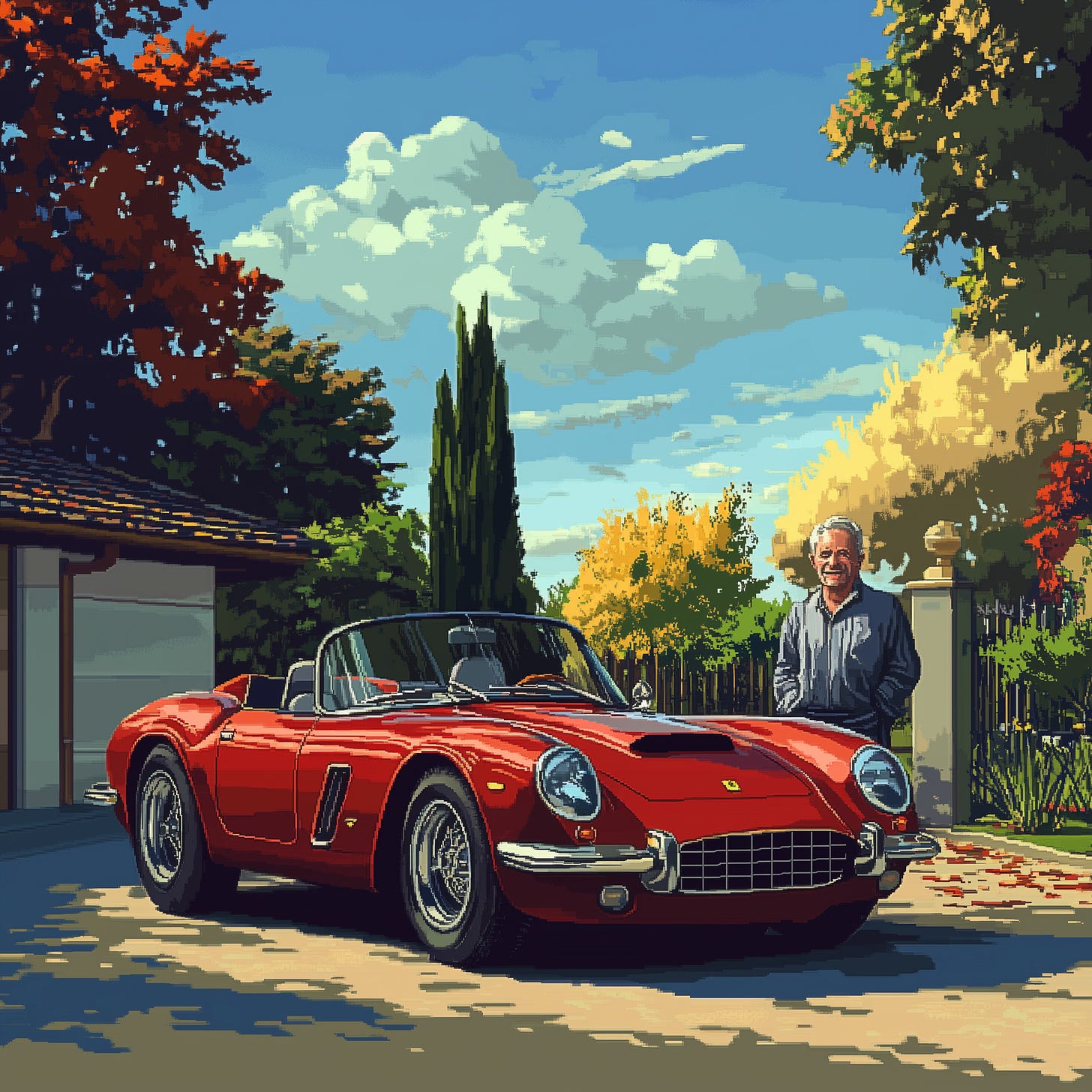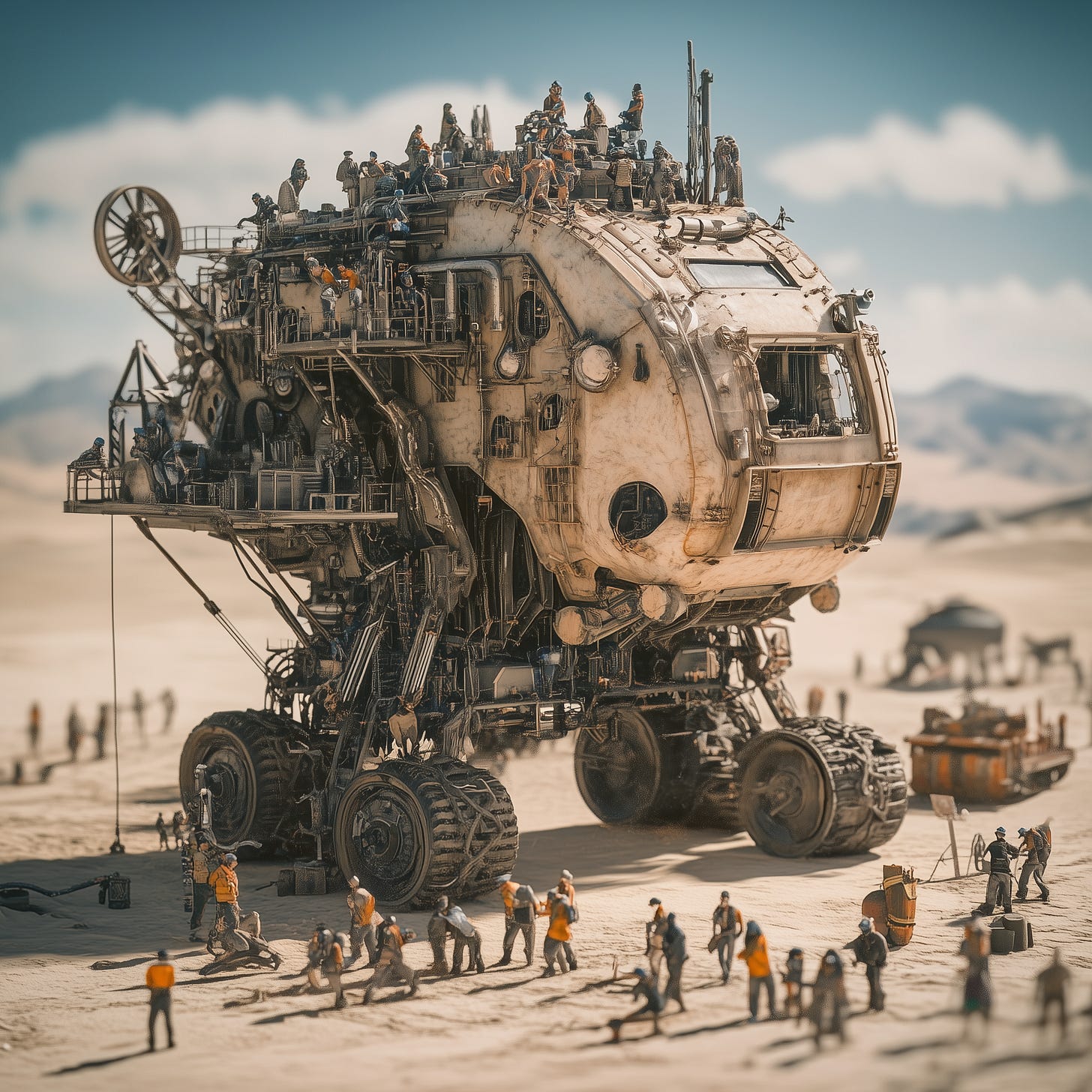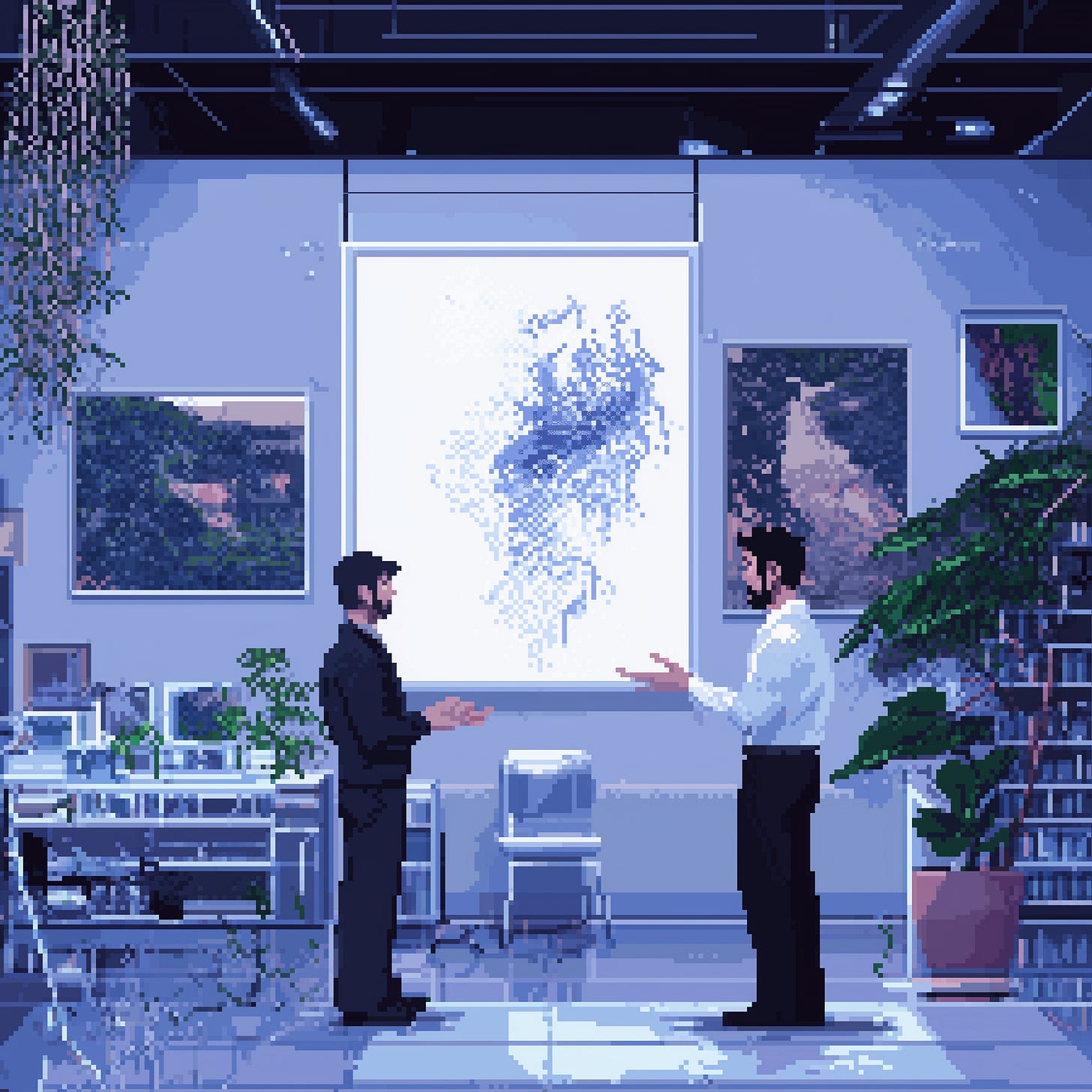Several Short Stories
On the Absurdity of Reality
The Scratch
Every Sunday, like clockwork, Gerald would roll his car out from under the tarpaulin. He’d step back, admire the shape, the symmetry, the promise of motion held in stillness. The car was his pride, not just a vehicle, but a shrine which gleamed like a mirror to his soul.
Today was no different. Sunlight broke through the clouds and danced across the surface of the hood as he polished in slow, sacred circles. But then he saw it.
A scratch.
Just a faint one, no longer than a finger. But to Gerald, it was sacrilege.
His breath caught. He leaned in and ran his fingertip over the insult.
“It wasn’t there yesterday,” he muttered.
He opened the garage door, pulling out his entire collection of tools including rubbing compounds, microfiber cloths, precision applicators, and got straight to work on the scratch.
Hours passed. Circles, strokes, gentle pressure. A bit more. A little longer. The scratch began to fade. He smiled.
“Almost gone,” he whispered, sweat running down his temple.
At last, as the sun began to dip, the scratch disappeared, absorbed into the gloss like it had never existed.
He stepped back, triumphant.
Only then did the camera zoom out. Or perhaps the veil lifted.
The car, if you could still call it that, was a charred husk. The roof had caved in. The tires were nothing but melted rubber puddles. The doors, twisted and blackened. The windshield had shattered inward long ago. And around the ghostly figure of Gerald lay scorched earth and cracked concrete, the aftermath of some long-forgotten fire.
Only the panel he had been polishing, a small section on the passenger side door, still bore the faintest hint of paint, as if spared by his obsession. A tiny square of normalcy in a world long since turned to ash.
And yet he beamed with pride, content that he had fixed it.
The scratch was gone; although he didn’t seem to notice the smoke still rising from the rest.
Feed the Machine
They called him Slacker.
It wasn’t his name, of course. He had one once, but names don’t matter in the Valley of the Machine, as they drop away from your being like the leaves of an autumn tree. What matters is your Position, and your Position is to Push. That’s what you’re born into: naked, screaming, and already late for your shift.
The Machine was massive. It was a vast, clanking monstrosity with gears that sliced the sky and pistons that cracked the earth. Nobody knew what it did. Nobody asked. The elders said it was Progress. The scholars called it Civilization. The priests whispered it was Salvation. But all anyone actually did was Push.
Push your assigned lever.
Push your quota.
Push your limits.
Push until your bones clicked and your breath caught and your mind dimmed to the rhythm of the grinding gears.
Except Slacker.
He was given his Position, just like everyone else, of a small lever near the machine’s eastern lung.
But Slacker just stood there on his first day, recoiling at the horror of the beast, surprised that anyone would just do as they’re told without so much as a grumble. And ever since then, he had refused to play along.
“You’ve got to be kidding me,” barked a woman named Grindelle, her face soot-streaked and twisted in fury. “You think you’re too good to push?”
“I think I’d rather not be ground to paste by a thing I don’t understand,” he said quietly.
“Paste?” laughed a man with a twitching eye, scarred from shrapnel flung by a rebellious cog. “This machine feeds us!”
“No, we feed it,” Slacker replied. “And it eats us.”
The crowd had gathered by then, as it usually did to throw insults at the lone freak who refused to ‘help’. Pushing was temporarily halted, again, as usual. This was sacrilege, worse than blasphemy; it was inefficiency. The valley murmured.
“He’s lazy.”
“He’s selfish.”
“He’s the reason production is down.”
They howled and cursed him with teeth bared and fists clenched, until a boy, no older than ten, threw a bolt at his head.
But Slacker just stood there, eyes fixed on the humming bulk of the Machine. He saw it clearly now; the conveyor belts that led nowhere, the outputs that only produced smoke and ash, and near the base, the charred remains of those who pushed too hard, too long, until the Machine took the last of them in a shuddering groan of molten steel.
“You’ll die alone, doing nothing!” someone spat.
But Slacker smiled, faintly. “Better that,” he said, “than die doing everything for nothing.”
They resumed their pushing soon after. The brief interruption meant longer hours to meet the day’s quota. But in the corners of their eyes, as they strained and heaved, a few glanced over at the one who would not push and wondered, silently, fearfully, if maybe, just maybe, he had a point.
But the gears turned, the pistons hissed, and the Machine drowned out all doubt.
The White Painting
A Play in One Act
Scene: A sparsely lit gallery. One giant canvas hangs on the wall. It is—unambiguously—white.
⸻
Alex: So… yeah. It’s white.
Jordan: Mm. I wouldn’t be so sure.
Alex: I mean—it’s literally white. Like, actually, clinically, indisputably white.
Jordan: You’re seeing what you’ve been conditioned to see.
Alex: Conditioned? It’s white paint on a white canvas.
Jordan: Is it? Or is it the absence of color posing as presence?
Alex: …What?
Jordan: Consider: if white is all colors, is it really any color?
Alex: Okay. Philosophically intriguing, but no. Not helpful. We’re in a gallery. The label says “White #4.” The artist said “I painted this white.” It’s. White.
Jordan: Or perhaps it is merely a mirror, reflecting the blankness inside you.
Alex: Excuse me?
Jordan: What if the canvas is questioning your assumptions? Challenging your concept of “whiteness” itself?
Alex: I’m not debating metaphysics with a canvas.
Jordan: Maybe that’s exactly what it wants.
Alex: It’s not sentient. It’s white.
Jordan: You keep saying it’s white. But have you felt its whiteness? Have you interrogated its hue? Could it be a very pale green ashamed of itself?
Alex: What the hell does that mean?
Jordan: Or perhaps it’s not color at all but a commentary. A protest. A whisper of anti-color.
Alex: You’re arguing against white. What’s next? Denying rectangles?
Jordan: Ah—but what is a rectangle?
Alex: Please stop.
Jordan: No. You stop. You stop projecting your colonial pigment paradigms onto the canvas.
Alex: It’s literally Titanium White from the art store!
Jordan: From whose perspective?
Alex: The paint’s!
Jordan (stepping closer to the canvas): Look… in the lower left quadrant. Do you see it?
Alex: See what?
Jordan (whispering): The resistance.
Alex (beat): …You need help.
⸻
[Lights dim. The canvas continues to be white. Possibly more white than ever before.]




